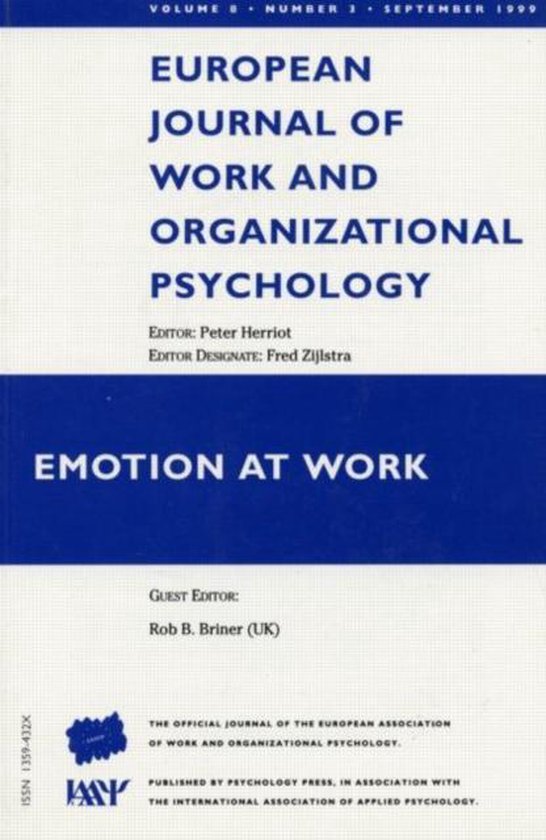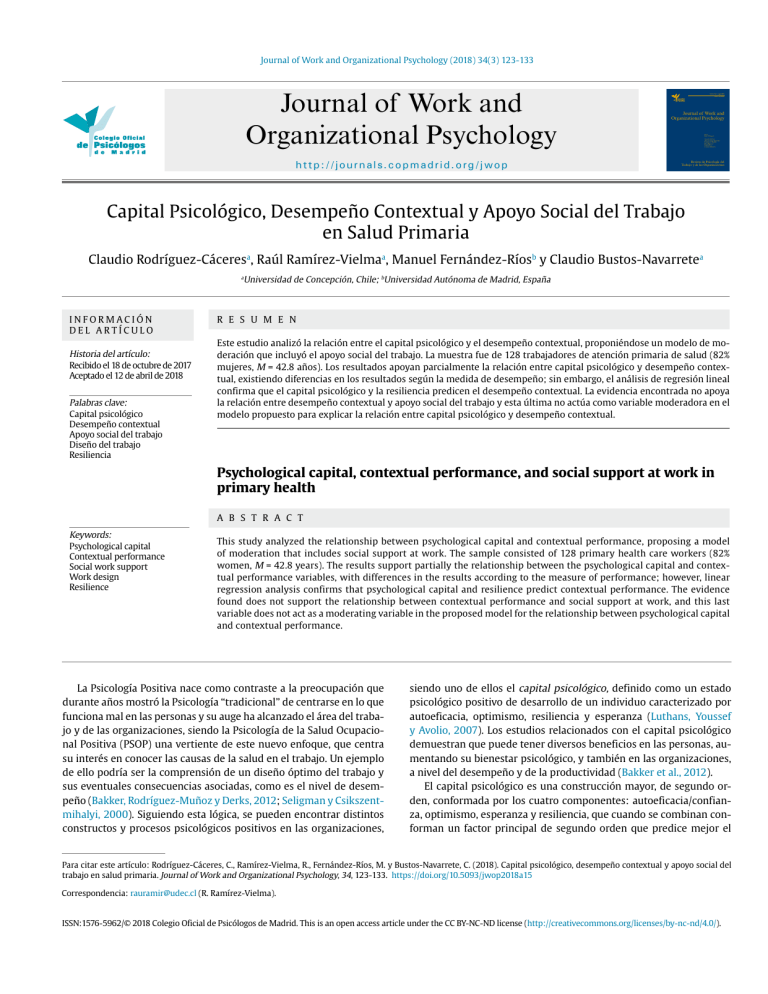“To work, or not to work, that is the question” Recent trends and avenues for research on
Scope. The mission of the European Journal of Work and Organizational Psychology is to promote and support the development of Work and Organizational Psychology by publishing high-quality scientific articles that improve our understanding of phenomena occurring in work and organizational settings. The journal publishes different types of high.
Psychology European Journal of Work and Organizational · of the dimensions of the Organizational

The popularity of remote work continues to rise, but uncertainty remains about how it influences employee well-being. We extend the Demand-Control-Person (DCP) model to test both person and job factors as important considerations in remote work, suggesting that emotional stability influences the utility of autonomy as a job resource in protecting employees from strain. Additionally, we test.
(PDF) European Journal of Work and Organizational Psychology ISSN (Print) ( "Money's too tight

Work engagement is associated with important individual and organisational outcomes (e.g. employee health and well-being, performance). This narrative systematic review aims to synthesise the increasing number of work engagement interventions and inform future research by exploring: (1) the specific intervention foci, delivery methods and content of engagement interventions; (2) intervention.
(PDF) European Journal of Work and Organizational Psychology ISSN (Print) ( How do weekly

Editorial board. Editor: Sandra Ohly - Institut für Volkswirtschaftslehre, Kassel University, Germany. Associate Editors: Joeri Hofmans - Vrije Universiteit Brussel, Belgium. Bettina Kubicek - University of Graz, Austria. Roni Reiter-Palmon - University of Nebraska at Omaha, USA. Michelle Tuckey - University of South Australia.
Special Issues of the European Journal of Work and Organizational Psychology Emotion... bol

Organizational Psychology. Publication details, including instructions for authors and. subscription information:. European Journal of Work and Organizational Psychology,
Journal of Occupational and Organizational Psychology Vol 91, No 1
The mission of the European Journal of Work and Organizational Psychology is to promote and support the development of Work and Organizational Psychology by publishing high-quality scientific articles that improve our understanding of phenomena occurring in work and organizational settings. The journal publishes different types of high-quality empirical articles using quantitative or.
Importance of Industrial Organizational Psychology in Human Resources Management Exeed College

Journal of Cross-Cultural Psychology, 1(3), 185-216. Google Scholar. Brown S. L., & Eisenhardt K. M. (1997). The art of continuous change: Linking complexity theory and time-paced evolution in relentlessly shifting organizations.. European Journal of Work and Organizational Psychology, 4(4), 367-380. Google Scholar. Wang Z., & Wang N.
Current Issues in Work and Organizational Psychology UK education collection

european journal of work and organizational psychology 5 is worth mentioning that none of the studies included in this systematic review explored all of the five well-being dimen-
Special Issues of the European Journal of Work and Organizational Psychology Do I See...

European Journal of Work and Organizational. Psychology. Publication details, including instructions for authors and subscription information:. European Journal of Work and Organizational.
(PDF) The European Journal of Psychology Applied to Legal Context

The mission of the European Journal of Work and Organizational Psychology is to promote and support the development of Work and Organizational Psychology by publishing high-quality scientific.
(PDF) European Journal of Work and Organizational Psychology The role of personal resources in

Based on the findings of our review, we present a critique of the evidence base for DSPs in industrial, work and organizational psychology and set out an agenda for advancing research. We identify pressing gaps in our understanding of DSPs, and ten key questions to be answered.. and future research challenges. European Journal of Work and.
15765962rpto3430123

Journal metrics in brief. Usage and acceptance rate data above are for the last full calendar year and are updated annually in February. Speed data is updated every six months, based on the prior six months. Citation metrics are updated annually mid-year. Please note that some journals do not display all of the following metrics (find out why).
Psychology, 8th Edition 9781305118423 Cengage
This paper reports the most comprehensive meta-analytic examination of the relationship between leadership and both followers' creative and innovative performance. Specifically, we examined 13 leadership variables (transformational, transactional, ethical, humble, leader-member exchange, benevolent, authoritarian, entrepreneurial, authentic, servant, empowering, supportive, and destructive.
(PDF) The relations between work centrality, psychological contracts, and job attitudes The

An emotional journey to speaking up: understanding when and how employee daily emotions relate to promotive and prohibitive voice. Nai-Wen Chi et al. Article | Published online: 28 Mar 2024. View all latest articles. Explore the current issue of European Journal of Work and Organizational Psychology, Volume 33, Issue 2, 2024.
European Journal of Education and Psychology

The European Journal of Work and Organizational Psychology was established in 1991 and is a peer-reviewed academic journal published quarterly by the European Association of Work and Organizational Psychology. Content includes papers on organizational change, organizational climate, teamwork, motivation, innovation, leadership, bullying, stress.
The European Journal of Psychology Applied to Legal Context Sociedad Española de Psicología

Examines job insecurity in connection with increased unemployment and the use of large workforce reductions to improve organizational effectiveness and competitive ability. Addressed are some issues concerning these relationships that have not yet been fully addressed in previous research: concerns about the continued existence of one's job (quantitative insecurity) and important job features.
.